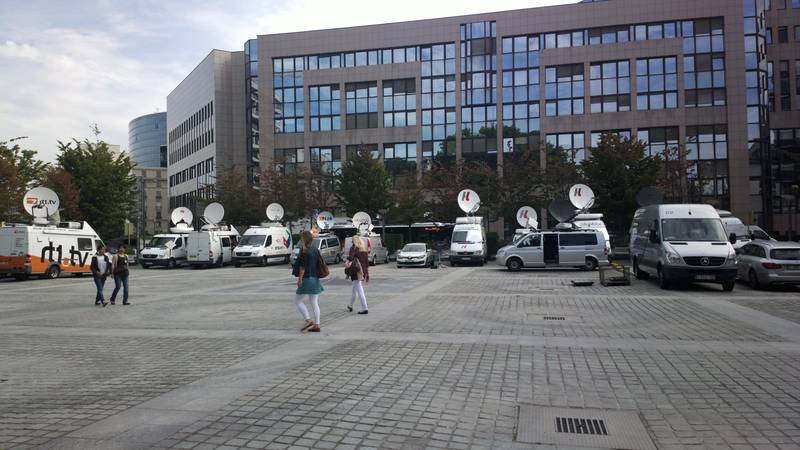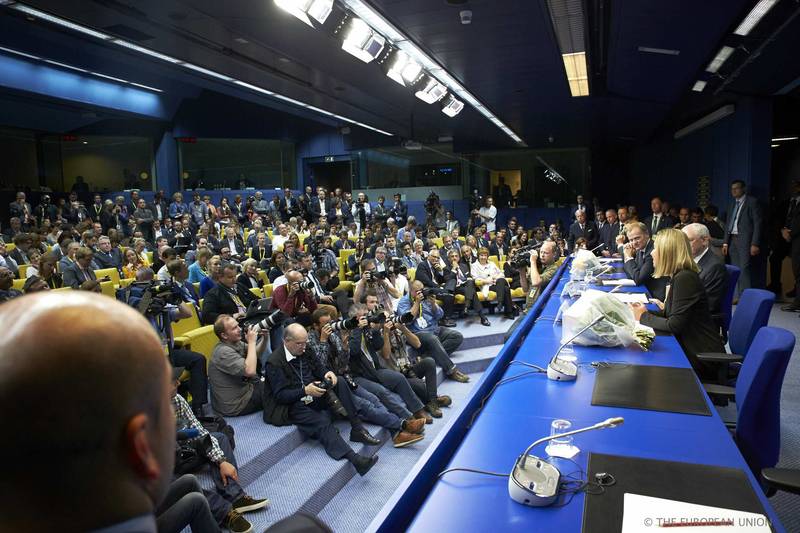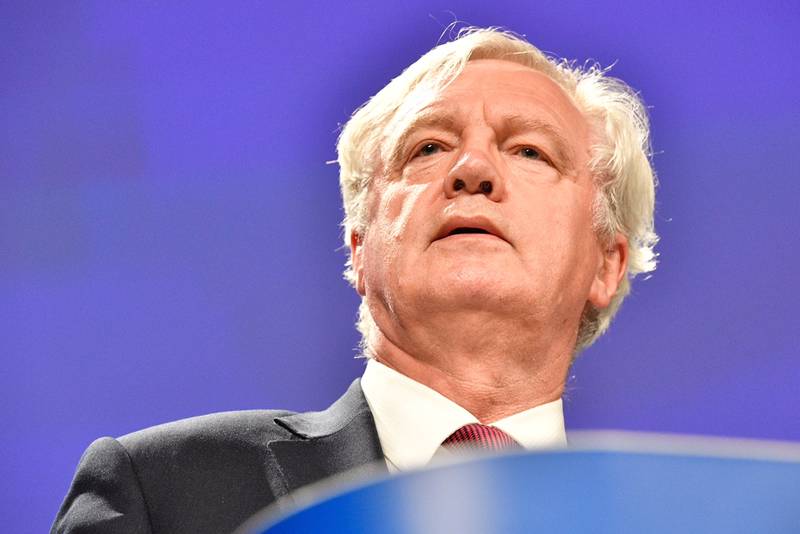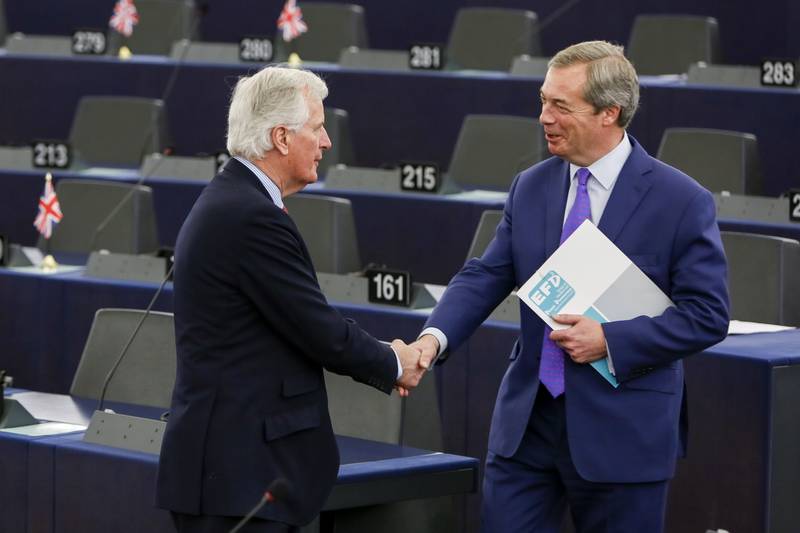Not Brussels Bureaucracy, Bulgarian Media Have Failed
Adelina Marini, June 27, 2016

Just four days have passed since the news of the Brexit broke, British society has not yet come out of the shock, and Brussels is yet to host meetings of leaders to project the way forward, but in Bulgarian public domain responsibility has already been strictly allocated. The one responsible for the decision of British voters is Brussels bureaucracy, which is cumbersome and authoritarian, declared a myriad of journalists, who would be hard pressed to prove any acceptable experience at the European scene.
This is also the predominant feeling in social media, regardless of opinion polls showing for years that Bulgarians are among European citizens, who trust European institutions the most. The autumn regular survey [English + Bulgarian language] of Eurobarometer from November 2015 shows that Bulgarians trust European institutions much more than other countries and their trust in national institutions is amongst the lowest in the EU. For example, 45% of Bulgarian citizens trust the European Parliament. The EU average is 38%. Trust in the European Commission is also high – 41% of Bulgarians vs. 35% in the EU. Just 23% trust the national government, while this percentage in the EU is 27. Trust in the national parliament is even further spread – just 14% of Bulgarians trust it, while in the EU 28% believe in their national parliaments.
At the same time, an interesting detail in the autumn Eurobarometer is the fact that in Bulgaria the share of television channels as primary source of EU news is the highest – 67% of Bulgarian citizens stated they get their information from there, while the EU average is 55%. The survey also shows that 90% of Bulgarian citizens watch TV every day. And what do they see over the last few days? How fast the British infection has spread. The campaign of the ones wanting out of the EU was entirely based on untrue facts and outright lies, lapped up by many media, not just the tabloids. There was a time when British media served as an example for how journalism is done, but they have failed in the most critical moment for their country – when they had to inform British citizens, so that they can make a sober and informed fateful decision whether their country remains a member or it leaves.
This is a great blow to Brits, who keep talking haughtily to Europeans about their ancient democracy. But let us not be too quick in worrying about the British, because regardless of a momentary decline, British democracy has deep roots and the debate about who is responsible are heavily underway in the British public space. More and more fingers are pointed namely at the media. This is the reason I have no doubt that sooner or later Great Britain will come out of this crisis more mature and stronger. The Brexit, however, shows that Bulgaria has serious problems and if someone is heading for serious trouble it is the Bulgarians. Not only is their democracy not stable, it is of dubious quality as well. And this is a serious threat to Bulgaria’s EU membership and to Bulgaria itself in case the EU suffers from the Brexit.

Over the last few years Bulgarian media have drastically reduced their correspondent positions in Brussels and reduced allowances for reports from the European capital. Apart from having correspondent positions reduced, those who have correspondents only have one, which makes it absolutely impossible to follow more than 1-2 subjects. In comparison, large British media have entire correspondent bureaus in Brussels, with several people working in them, so that they can covers several subjects simultaneously. Yet British citizens get indoctrinated with euroscepticism. The British case is, of course, different, but having correspondents in Brussels is a very important factor.
News about events in our European Union, of which we have been a member for almost 10 years now, usually come to us through the international exchange, refracted of course through the interests of the respective large international media channels and their audience. Meaningful and informed talk about the EU proves to be the scarcest of commodities lately. At the moment, in the role of experts speak colleagues, who go to Brussels only if someone organises and finances their trip there. Usually, these are the much hated European institutions – the European Parliament and the Commission. Those trips, however, are in the form of seminars and do not allow journalists enough time, especially those without experience in reporting on the EU, to amass background and acquire a nose for what is news in the huge European information torrent, which all European institutions spew out on a daily basis.
Another source of travel allowances for a short trip to Brussels are MEPs or individual political parties, which, as I hope is evident, brings certain political skewing. Those business trips are too few and usually Bulgarian media rotate journalists, so that more of them can go see the European capital, which does not allow for the formation of professionals – people who will amass experience, background, and contacts. To do this you need media to have specific people covering European topics, understanding them and knowing which event is worth reporting and which isn’t. The process is currently reversed – editors decide what is important and what isn’t, lacking any of the necessary knowledge and experience (by the way this is not a solely Bulgarian phenomenon if this is any consolation).
And the result is evident – journalists, who are otherwise experienced in their respective fields, talk about the EU like kindergarteners, repeating pivot points heard somewhere. Whether they repeat them intentionally, or just because they have nothing else to say is a separate issue, although not less important. The Brexit’s large failure and in the wider context of euroscepticism is not Brussels’ bureaucracy, but Bulgarian media (in our case, because this is not a problem of just Bulgarian media, but all the rest as well). National media, including experienced Brussels correspondents are often forced by their head offices to follow mainly the national aspect.  As we say among ourselves – Brussels news do not sell well. Most sellable are scandals, intrigues, a crisis or two.
As we say among ourselves – Brussels news do not sell well. Most sellable are scandals, intrigues, a crisis or two.
This is a huge problem for journalism in general, because the EU is seen as something distant, which we have not much in common with, and this is not so. Moreover, in critical situations it turns into the enemy in our bed – bad Brussels, which dictates to innocent national politicians what to do. Starting from European law having precedence over national law and ending with economic data, according to which Bulgarian economy is almost entirely dependent on European funds, the lack of in-depth coverage of European issues leads to a skewing of not only the EU, but national policy as well.
Journalists’ main role of criticising and demanding accountability for decisions made is practically blocked by national media, who lend more resources on national issues, without even refracting them through the European context. Instead of journalists quickly exposing the politicians’ shallow plans to wash their hands with Brussels in order to remain on the national political scene or lessen inter-party pressure, journalists get caught en-masse in the trap and start talking about Brussels without any proof or facts.
Last year, I pointed at another very serious problem for EU media coverage – the fact that national briefings, meaning the location where one could learn more about national positions and build a clear picture on a certain dossier, are usually without translation to another European language. The reason is that the translation into another language is financed by national budgets and most member states cut this expense. France and Germany are the exceptions, but only when it is about summits. All other meetings at ministerial level end with briefings without translation. This is also a large obstacle for those, wishing to check the temperature of other members, which would help a lot in presenting the national position. And we should not forget that there are 24 official EU languages.
So, even if Brussels bureaucracy has its defects, most media and journalists are unable to understand this and oppose it adequately, as our profession demands. Moreover, media often resort to inviting experts with dubious expertise on European subjects, which brings further turmoil in an already complicated atmosphere. The funniest thing is that the only shows dealing with European subjects are usually financed by European projects. The thing is, it is not Brussels’ bureaucracy that is to blame, but media, who have abdicated from their main function – bringing unbiased information to society.
Translated by Stanimir Stoev
 David Davis | © European Commission
David Davis | © European Commission Angela Merkel | © Council of the EU
Angela Merkel | © Council of the EU Michel Barnier, Nigel Farage | © European Parliament
Michel Barnier, Nigel Farage | © European Parliament